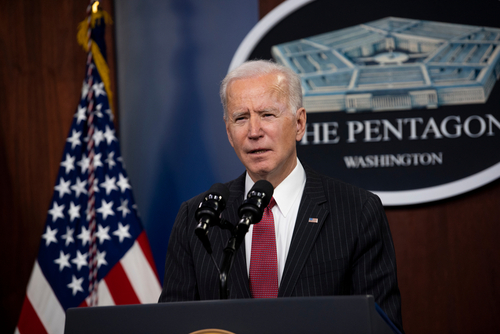U.S.(Washington Insider Magazine) – President Joe Biden has rejected his allies’ calls for an extension of the Aug. 31 deadline for U.S. withdrawal from Afghanistan in a virtual meeting of the Group of Seven (G7) industrialized nations on Aug. 24.
This follows pressure from various leaders of the group, including U.K. Prime Minister Boris Johnson, to do so and widespread doubts that the deadline can be met. After 20 years of U.S. military occupation, the Taliban regained control over Afghanistan as Washington planned to withdraw from country.
Over the past week, efforts to evacuate foreign troops, citizens and allies has intensified at the Hamid Karzai International Airport. As of 3 a.m. EST, the U.S. had evacuated 82,300 people from Kabul’s international airport since Aug. 14, The New York Times reported.
“U.S. and allied planes have flown an additional 19,200 people out of Kabul in the past 24 hours,” the newspaper reported.
While Biden would not commit to it, the president did not rule out an extension. He said the evacuation is on pace to be completed on Aug. 31, and that the “mission in Kabul will end based on the achievement of our objectives,” according to a statement from White House Press Secretary Jen Psaki.
She confirmed that Biden asked the Pentagon and the State Department for contingency plans to adjust the timeline of the evacuation if necessary, but would not specify what those plans look like.
The Taliban have stated that foreign presence in the country beyond the Aug. 31 deadline will not be tolerated, and according to Psaki, Biden voiced his concerns over the risk of U.S. troops should they stay past the deadline, citing the threat of terrorist attacks on troops from ISIS.
On Aug. 24, at a news conference, the Taliban said they will no longer allow Afghans to leave the country. The hardline Islamist group’s spokesman Zabihullah Mujahid said the U.S. “can take all the people that belong to them but we are not going to allow Afghans to leave and we will not extend the deadline.”
In a joint statement, G7 leaders expressed “grave concern” over the situation in Afghanistan, and urged the Taliban to adhere to obligations under international human rights law.
“Our immediate priority is to ensure the safe evacuation of our citizens and those Afghans who have partnered with us and assisted our efforts over the past 20 years, and to ensure continuing safe passage out of Afghanistan,” the statement read. “We will continue to coordinate closely on this.”
Following the meeting, U.K. Prime Minister Boris Johnson said that the group set a “roadmap” for dealing with the Taliban going forward, and that the first condition was safe passage out of the country for those who want to leave.
“The number one condition we’re setting as G7 is that they have got to guarantee, right the way through, through 31 August and beyond, safe passage for those who want to come out,” said Johnson in his remarks.
The G7 statement also said that a future Taliban-led government will be judged on its adherence to international human rights standards.
“We reaffirm that the Taliban will be held accountable for their actions on preventing terrorism, on human rights in particular those of women, girls and minorities and on pursuing an inclusive political settlement in Afghanistan,” the G7 leaders said.
“The legitimacy of any future government depends on the approach it now takes to uphold its international obligations and commitments to ensure a stable Afghanistan,” they added.


























